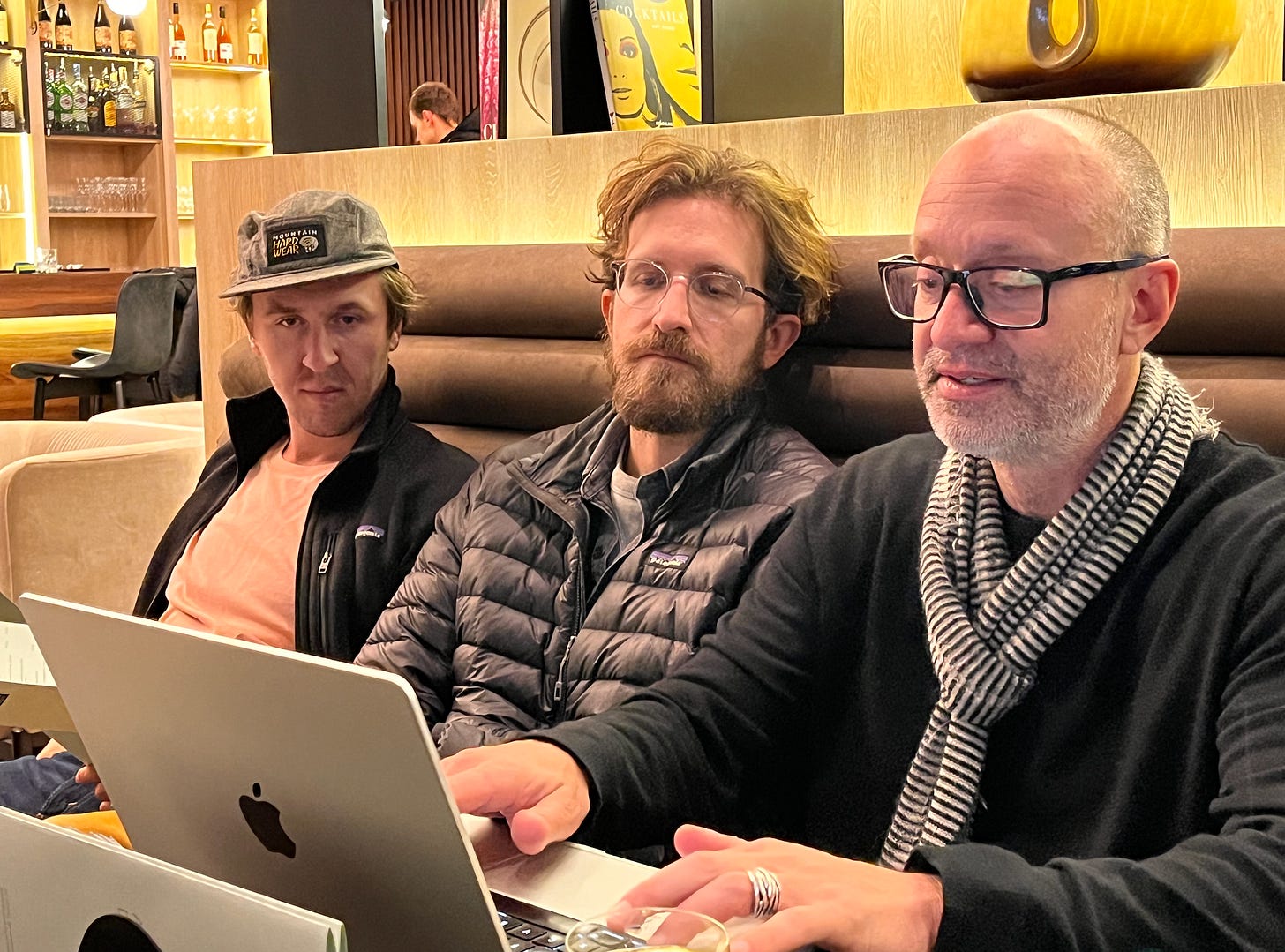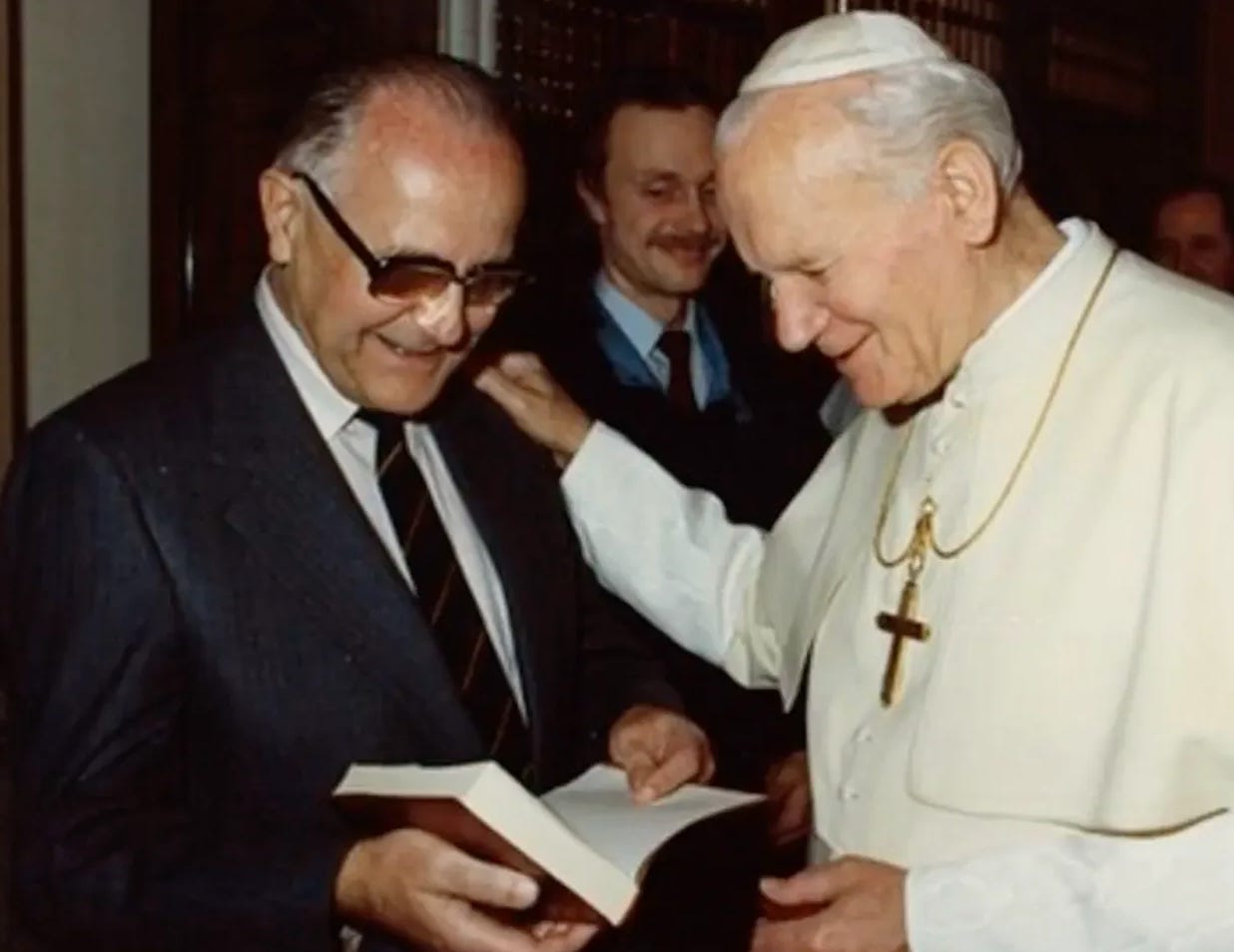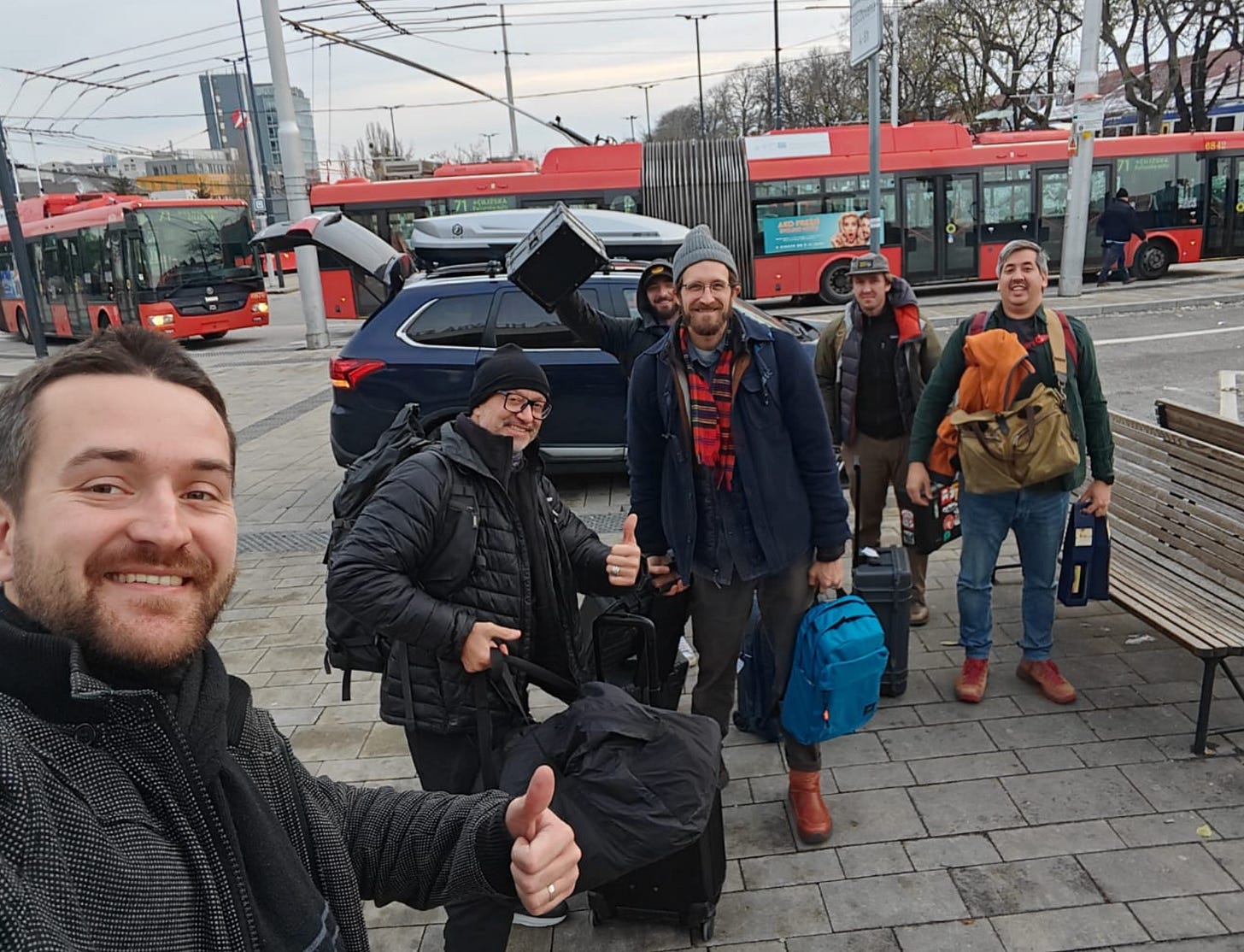That's A Wrap, Bratislava!
The end of the first leg of 'Live Not By Lies' documentary filmmaking
(Read the three previous ‘Live Not By Lies’ documentary shooting diaries here.)
Our Live Not By Lies documentary film crew spent most of Saturday with Jan Šimulčik (pron. “shee-mool-cheek”), a historian of the underground Slovak church, and, as a young man, a member and servant of it. We began with the place Jan took me to in 2019 when I first came to Bratislava to begin reporting for the book: to the hidden subterranean chamber under an ordinary house, where (in that room) the underground Catholic church produced samizdat — illegal books and printed matter to serve the church suffering under communism. Most of the men on this crew are Christians, so I knew it would affect them profoundly to see what Slovak believers had to do to keep the life of the Church going under severe persecution.
And it did. Here is our producer, David Jacobson, descending into the hidden tunnel that leads to the secret chamber:
You first have to go through this concealed entryway to get to the basement.
The second hole, very well hidden, is in this room. It leads to a tunnel that takes you up into a very small room where the underground church had an offset printer that produced high-quality hymnals, prayer books, and catechetical materials. Jan, who was part of this operation, told us that the printing machine was smuggled into the Slovak capital by people from Open Doors, the Dutch-based Evangelical mission that served — and still does! — the persecuted church. Open Doors operatives smuggled the printer in, piece by piece, then sent in another team to reassemble it in the hidden chamber. Jan said that this was “ecumenism at its best,” and that the Slovak Catholics can never repay their Evangelical brothers and sisters for their kindness.
Brad Knull, our director of photography, wept as he stood in the hidden chamber. He told us that his mother and father used to donate to Open Doors, and he can remember as a child praying for the persecuted church, at their direction. And now, in Bratislava in 2023, he is seeing physical evidence of what his mom and dad’s faithful generosity did. It was a powerful moment of connection, and gratitude within the communion of saints.
Jan took us by the small apartment of Silvester Krčmery, who, along with Father Vladimir Jukl, were the founders of the underground church. (Jan called them the Cyril and Methodius of the secret church.) Dr. Krčmery, who spent 14 years in prison for his church activities, lived there until his passing in 2013. (I wrote about him in this issue of Rod Dreher’s Diary). It was jarring to see that one of the great heroes of the faith of the 20th century lived in such ascetic modesty. In his bedroom, I spied a Slovak copy of his 1995 memoir This Saved Us, which is a tale of his imprisonment, and the techniques he and his fellow Christian prisoners used to hold out against Communist brainwashing.
I opened the book up and was startled to see this:
It was inscribed by St. John Paul II, whom Silvo had known since Karol Wojtyła’s time as Archbishop of Krakow, and visited in the Vatican! The pope underlined the title: “This Saved Us”. The Holy Father’s inscription, after Krčmery’s name, reads:
… who testified
to Christ and the Church
with blessing
John Paul II
April 11, 1995
I held that in my hand! Someone, I forget who, on this trip told us that when Krčmery and other Slovak dissidents dined at the Vatican with the pope, Krčmery would sometimes interrupt the Holy Father. The Pope responded by smiling and saying, “Silvo, Silvo, Silvo” — obviously delighting in the man’s company.
Later we went with Jan to a private one-room exhibition of a collector’s stash of totalitarian objects. It’s called the Muzeum Totality. Jan is photographed above being interviewed there. Amazing place.

The crew spent a lot of time out and about, both in Prague and Bratislava, shooting “B-roll” — images of the landscape and the cityscape of these beautiful central European cities. Marek Novak, our local fixer, got everybody around town. Later in the morning on Sunday, we met with Eugen Valovič, a key actor in the underground Slovak Catholic church. You can see below how filled with joy his face is. He talked about the critical importance of small groups in providing resistance to totalitarianism. The late Father (later Cardinal) Jan Chryzostom Koreć told Eugen that without the small communities, all would be lost. Eugen believes that the gift of small communities is perhaps the greatest lesson to emerge from the secret church’s experiences.
After lunch, we interviewed Jan Čarnogursky, a lawyer who defended the persecuted under Communism, and who, two weeks after his release from a Communist prison in 1989, sat at the table with Vaclav Havel and the other top dissidents, negotiating the handover of power from the Communists. Jan talked about how strange it was to be sworn in by Gustav Husák, the outgoing communist Czechoslovak president and the man most responsible for having thrown him in prison. Listening to Jan’s stories was once again to be awestruck about the things these people did for the sake of truth, justice, and their faith in God.
One thing I noticed: most of them are uncomfortable talking about the sources of their strength during that time. I suspect it’s for the same reason veterans of World War II combat did not want to talk about their valor in battle. As a young reporter in Washington working on a story about members of Congress who served in the D-Day invasion, I received advice from an older military journalist, who told me not to be discouraged if I couldn’t get the veterans to open up about that day. He said that WW2 vets struggle to talk about themselves, because they are loath to hold themselves up as examples of virtue. They believe that they did not do different than anybody else, and are inhibited by a sense of modesty verging on survivor’s guilt. I don’t know, of course, but I would expect that this kind of thing is at work in these heroes of the anti-Communist struggle.
A couple of our key interviews — with František Mikloško and Vlado Palko — had to be postponed until the crew comes back to Europe after the first of the year. Both men were sick. Seems that everybody is getting sick over here. Our line producer, Andrew Hummel, was hard-hit the last two days. We were able to speak to Gabriela Spanikova, 88, the sister of the Silvo Krčmery, and the only surviving member of his generation.
While we were setting up in Gabriela’s flat, I spoke with her son, a doctor, who told me about his Uncle Silvo. He said Silvo was so merry. Even though he was bedridden for over a decade at the end of his life, he never stopped singing, even in his bed. Later, Gabriela told Isaiah Smallman, who did the questioning, that her brother sang all the time in their childhood. She said that Silvo refused to hate the men who had imprisoned and tortured him. He was completely sold out to Christ, and knew that love, not hate, had to prevail. Listening to this, I recalled from Silvo’s memoir him saying that after his first prison beating, he cherished his wounds, because they were proof that he had shared in Christ’s suffering.
Gabriela told us that their father had instilled strongly into her and her siblings’ hearts a hatred of lying. Once one of her brothers was caught in a lie. Their dad kicked him out of the house, but relented when the siblings begged him to show mercy. “But he never told another lie,” she said. I can’t remember if I heard this correctly or not, but I think their father once went out wearing his overcoat inside out, to show his children the importance of not caring what others thought of you. These things, plus the piety of the family, were part of what made Silvo such a strong witness.
Gabriela was present as a 19-year-old for her brother’s 1954 trial for “treason,” which is what the Communists called evangelization and churchgoing. This statement of Silvo’s is from the transcript of the trial. He is addressing the court:
God gave me everything I have and now that I face persecution because of Him, and am called on to profess my faith in Him, should I now pretend I don’t believe? Should I hide my faith? Should I deny Him?
… We will not allow ourselves to be led to hate, to rebel or even to complain. There are already hundreds of people who can testify to that. That is where our strength and superiority lie. We know how to return good for evil and we know that all our brothers will work harder and more selflessly than others (just as Christ taught us). After all, we are following an old tradition. The first Christians who were persecuted under the Roman empire, though imprisoned by the hundreds, tortured and crucified, were the most self-sacrificing workers, even after they were imprisoned and sent to hard labour in mines. There is no record that we know of which states that they organized any rebellion.
The most famous statement of Silvo’s in that address to the Communist judges, Gabriela repeated on camera. This is the first time she has ever spoken of it in public. Silvo’s words to the military court:
"You have power in your hands, but we have the truth. Whoever has power in his hands thinks he can suppress the truth. Kill it, or even crucify it. But the truth has always risen and will rise from the dead."
He was 30 years old when he said that, and had already spent three years in brutal pre-trial detention. Silvester Krčmery would not leave prison until he was 44 years old. His family wanted to appeal for an amnesty release, but he refused, saying he it would be wrong to accept early release when so many innocents remained behind bars.
I’m back in Budapest now, and both exhausted and exhilarated by the last week. Y’all, this is going to be a great movie. If you were one who contributed to the Angel Studios fundraising, once again, I thank you, and let me assure you that your faith in this project is well placed, and your money well spent. I think this coming weekend I’ll be joining director Isaiah Smallman and producer Dave Jacobson for a live online chat talking about this adventure. Maybe they’ll be able to show some of the raw footage. My heart feels so much stronger after this past week. We do walk through a vale of tears, but when you have men and women like the ones we met and filmed this past week walking with you, one’s pilgrim steps seem so much lighter.












I had forgotten that there's an LNBL documentary Twitter account. I guess the production team is running it. They just posted this short clip of me and the team interviewing Kamila Bendova in her Prague apartment last week. This flat was an epicenter of the Czech anticommunist resistance. Havel and others met there all the time. Kamila wouldn't let us move the round table in the dining room behind us because it had belonged to Vaclav and Olga Havel, but had collapsed when the secret police's recording devices fell out of the ceiling on top of it. The Havels were going to throw it away, but the Bendas asked for it. The repaired it, but Kamila isn't sure how stable it is. It hadn't been moved since Communism fell! Anyway, watch this short clip: https://twitter.com/livenotbyseries/status/1731789303796130195
"God gave me everything I have and now that I face persecution because of Him, and am called on to profess my faith in Him, should I now pretend I don’t believe? Should I hide my faith? Should I deny Him?
… We will not allow ourselves to be led to hate, to rebel or even to complain. There are already hundreds of people who can testify to that. That is where our strength and superiority lie. We know how to return good for evil and we know that all our brothers will work harder and more selflessly than others (just as Christ taught us). After all, we are following an old tradition. The first Christians who were persecuted under the Roman empire, though imprisoned by the hundreds, tortured and crucified, were the most self-sacrificing workers, even after they were imprisoned and sent to hard labour in mines. There is no record that we know of which states that they organized any rebellion."
That is truly the statement of a saint.